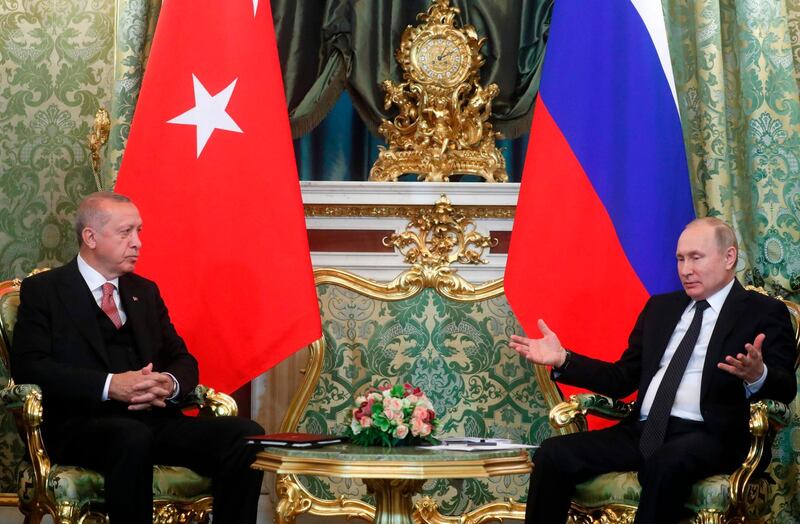Turkish President Recep Tayyip Erdogan has said his army is ready to launch an offensive against Kurdish groups in northern Syria and that he will discuss the plans with Russian President Vladimir Putin.
"Our preparations on the border are finished, everything is ready for an operation,” Mr Erdogan told reporters before flying to Moscow on Monday morning. “We can begin it at any moment.”
The Turkish president’s comments came ahead of his third meeting with Mr Putin this year. Ankara sees Kurdish groups operating in Syria as a security threat because of their links to the Kurdistan Workers’ Party, or PKK, which has waged an insurgency in Turkey since the 1980s. Over the past two years, Turkish forces have worked to rout Kurdish forces from parts of northern Syria.
The Kremlin said ahead of the meeting in Moscow that Messrs Erdogan and Putin would meet with representatives from the Russian and Turkish business community and attend an event marking the beginning of a year of joint culture and tourism between the countries.
The two leaders also said they would discuss joint energy projects and US President Donald Trump’s recent decision to recognise the Golan Heights, annexed from Syria in 1981, as Israeli territory. Both Turkey and Russia have spoken out against Mr Trump’s decision, and Kremlin officials have described it as counterproductive to brokering peace in the region.
Also on Monday’s agenda is a contentious missile systems deal between Russia and Turkey which has stirred controversy on the international stage.
Moscow has found itself at the centre of a dispute between Ankara and its Nato allies over Mr Erdogan’s decision to go ahead with a deal to buy the S-400 missile defence system from Russia.
Washington says Turkey’s decision to link the Russian systems poses a security risk to Nato and has threatened to impose sanctions on Ankara if it goes ahead with the decision. The US has also said it could withhold the delivery of fighter jets to Turkey.
Vice President Mike Pence recently became the most high-ranking US official to cry foul over Turkey’s decision to buy the S-400 systems from Russia.
"Turkey must choose,” he said in Washington at an event last week celebrating Nato’s 70 anniversary, between staying in the “most successful military alliance in history” or “reckless decisions that undermine our alliance”.
Turkish officials including Mr Erdogan have said time and again the purchase is a done deal and that US officials have no right to dictate who Ankara buys arms from. For Russia, the deal is an opportunity to drive a wedge between members of Nato, which Russia sees as a threat.
The close ties on display between the two leaders mark a sharp contrast to 2015 when Turkey shot down a Russian jet on the Syrian border, resulting in the death of a pilot. Mr Putin halted flights to Turkey and described the incident as “a stab in the back by the accomplices of terrorists”.
But the two presidents have become fast friends since a thaw in relations and closer coordination over the war in neighbouring Syria. Even though the presidents hаve backed opposing sides in the conflict, Russia and Turkey alongside Iran have formed an alliance to broker a solution to the eight-year conflict.
During Mr Erdogan’s last visit to Russia on Valentine's Day alongside the Iranian leader Hassan Rouhani, the three agreed to stall an offensive on the last bastion of opposition to Syrian President Bashar Assad, even though Russia has been impatient to rout opposition groups.
Mr Erdogan’s visit to Moscow comes shortly after local elections in Turkey, in which the president’s ruling party suffered embarrassing losses in key battlegrounds. The Turkish president’s party lost control of the capital Ankara and in Istanbul, the country’s largest city, which he once said was necessary to control to have national legitimacy. He has called for a recount in both urban hubs.






